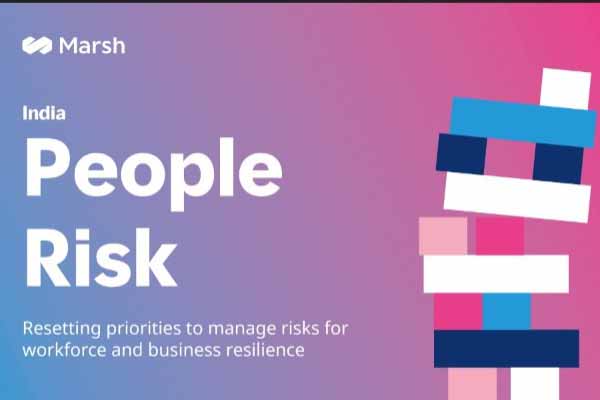Mumbai– According to a new report by Mercer Marsh Benefits (MMB), cybersecurity and data privacy is now ranked as the top people-related risk by companies in India, followed by the risk of administration and fiduciary risks, and changing nature of work.
MMB’s report, People Risk: Resetting priorities to manage risks for workforce and business resilience, surveyed over 2,500 human resources and risk professionals in 25 countries globally and includes data from over 600 respondents from Asia. As well as analyzing the top 25 people risks, the report identifies the main barriers these organizations face in addressing these threats. The report showed that respondents in India have higher awareness of risks in areas include health and safety, governance and financial, accelerated digitization, talent practices, as well as environmental and social, compare with their global and Asia counterparts.
In line with Asia and global findings, employee health and well-being is now considered as the Top-5 people risk in India. Although 90% of organizations in India say they are currently addressing risks associated with employee health and wellbeing, only 55% of Indian firms report having effective policies, practices, environments and communication in place to support a culture of employee health and well-being. Cybersecurity and data privacy is the other top risk in India based on severity and intensity. However, only 57% of organizations in India say they have mitigation measures in place regarding cybersecurity policies, controls and support systems (such as multi-factor authentication, training, vendor management and/or data encryption). While this figure is low, it is significantly higher than found globally (44%) or across Asia as a whole (48%).
Rising costs amid economic uncertainty – along with greater scrutiny on governance of total rewards – have also brought administration and fiduciary risk to the fore as a top risk this year. While wage inflation and rising healthcare costs continue to put pressure on budgets, only 62% of companies in India believe they have an effective, articulated cost containment strategy encompassing plan design, health risk management, and insurance placement to manage short- to mid-term benefit costs.
Joan Collar, Asia and Pacific Regional Leader, Mercer Marsh Benefits, said: “As the pandemic continues to accelerate digitalization, it is no surprise that cyber risks are considered as the top people-related risk in Asia. 95% of cybersecurity issues are due to human error, so reskilling and upskilling needs to be prioritized to ensure employees are keeping up with the technological development and changing world of work. A large part of human error can be attributed to employee burnout and fatigue due to ongoing pressure and anxiety caused by the pandemic, as well as antiquated systems and lack of proper cyber training.”
The report also notes the changing nature of work has come to sharp focus along with the pandemic. New business challenges with regards to workforce management, inequities associated with flexible working, as well as technology adoption and growth mindset can be potential sources of risk. Against this backdrop, however, only 52% of respondents stated that they have effective policies and support systems in place to enable remote, hybrid or other flexible ways of working and have effective competitive employee value proposition which includes reward practices (54%).
Prawal Kalita, Managing Director, Mercer Marsh Benefits, Marsh India, said, “The last two years have been very challenging across the globe, due to the pandemic, and it is no surprise that health and safety, cybersecurity and data privacy were rated amongst top 5 risks by both HR and risk managers. Health and wellbeing is a boardroom subject and organisations need strategic advisory on healthcare risk management along with right digital solutions and progressive partners to execute it efficiently”.
“We are also seeing an increasing focus of corporates on cybersecurity and data privacy given the acceleration of digitization and privacy breaches across the world. Need of the hour is globally scalable and secured benefit technology solutions that support higher employee engagement with highest standards of data privacy and security norms,” he added.
Further, less than half (47%) have clear, transparent and measurable plans in place to advance DE&I and only 55% have effective policies, practices, environments and communication in place to support a culture of employee health and well-being. “Companies need to adopt a more holistic approach to develop and engage their workforce and be very mindful of blind spots on the horizon, particularly around DE&I and ethics which are key to attracting and retaining the right people. Talent and benefit practices should also to be aligned with the values of the organization, and include a clear position on important issues such as climate change policy, diversity, equity and inclusion and equitable access to benefits,” Ms. Collar added.
















